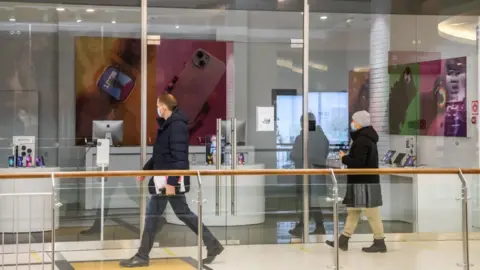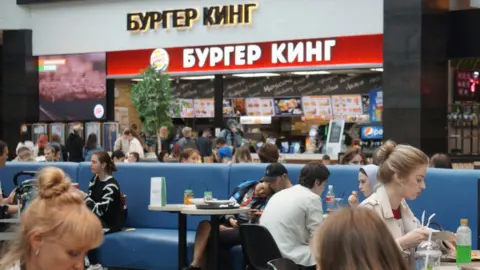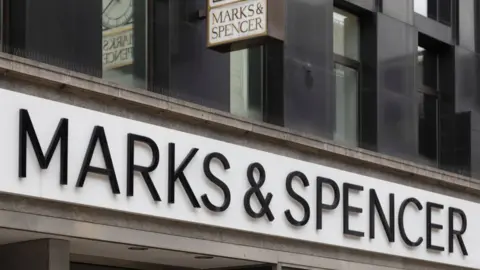The Western brands unable to leave Russia
 Getty Images
Getty ImagesThe invasion of Ukraine has led many Western brands to shun Russia, but some still have outlets open in the country and say they are not able to shut them.
Marks and Spencer, Burger King, and hotel groups Marriott and Accor are restricted by complex franchise deals preventing them from withdrawing.
The firms have outsourced the Russian businesses to third parties and do not own the operations bearing their name.
Together the firms have almost a thousand outlets still open in Russia.
M&S has 48 shops and Burger King has 800 restaurants still open, whilst Marriott and Accor have 28 and 57 hotels open respectively.
The BBC understands the brands are locked into legal franchise agreements, making it difficult for them to remove their name from Russia's High Streets and shopping malls.
A lot of Western firms have held such agreements for decades. For example, Marks and Spencer stores have been operated by a Turkish company called FiBA, which has held the rights to sell the retailer's products across Eastern Europe, since 1999. The retail giant has said it has suspended shipments of its goods to FiBA in response to the war.
 Getty Images
Getty ImagesMeanwhile, Burger King's owner Restaurant Brands International also told the BBC its restaurants are run by franchisees. These "long-standing legal agreements are not easily changeable in the foreseeable future," it said.
It is understood hotel groups Marriott, IHG and French chain Accor, which has Ibis and Novotel among its brands, are all operating in Russia under similar deals.
Marriott told the BBC its hotels in Russia were owned by third parties but said it would "continue to evaluate the ability for these hotels to remain open", suggesting it was looking into its franchise agreements.
Franchising is a business method of distributing products or services. It involves a franchisor, a company which has established the brand's name, and a franchisee, a company which pays a fee for the right to do business under the franchisor's name and sell its products.
Graeme Payne, a specialist in UK and international franchising at law firm Bird&Bird, told the BBC franchising was useful to Western brands who want to enter markets in different countries, but do not have local knowledge, money, or ability to enter them.
"You would as a member of the public… think why don't they just close their stores? But just from a pure business and contractual perspective, it's very difficult to do so without some far reaching legal consequences," said Mr Payne.
Those consequences could have serious financial implications for Western businesses, who could be sued by franchisees if they did break any agreement, which are often 10 or more years long.
Victoria Hobbs, a partner at Bird&Bird who deals with franchise disputes, told the BBC if a franchise owner was found to have links to Russian President Vladimir Putin or had been sanctioned, then from a UK perspective, a deal could be terminated.
 Getty Images
Getty ImagesHowever, Ms Hobbs said although agreements often have a clause that states "if the franchisee is doing something to damage our reputation we can terminate", the problem currently in Russia is that many franchisees themselves are not doing anything wrong.
"It is quite challenging for them because, from an English law perspective, they don't really have a right to bring the agreement to an end - that's the problem," she said.
Even if a brand managed to succeed in getting a UK court judgment against a franchise in Russia, "the Russian courts wouldn't enforce it", according to John Pratt, a partner at the largest team of specialist franchise lawyers in Europe.
In the meantime, the firms are trying to do what they can to help with the situation and all have announced support for Ukraine following Russia's invasion.
- Accor, which has 57 branded hotels in Russia and 3,500 employees there, has suspended all future hotel openings and has stopped services and distribution to hotels affected by sanctions.
- Burger King is redirecting its profits from franchised operations in Russia to humanitarian efforts
- Marriott and IHG Hotels & Resorts, which each have 28 hotels operating in Russia under their brand, have also halted hotel developments and investments and have closed their corporate offices - which they own themselves and so have control over - in Moscow
- M&S has pledged more than £1.5m to support refugees and is donating 20,000 coats and thermals
However, while many brands are stuck in Russia, Yum Brands, which owns KFC and Pizza Hut, said it was finalising an agreement with its main franchisee to temporarily halt Pizza Hut operations.
Ms Hobbs, partner at law firm Bird&Bird said she believed brands were "very worried" about any potential reputational damage from continuing to operate in Russia.
"They are worried obviously on a human and moral level about what is happening, but I also think they are worried [that] a number of companies have been threatened with boycotts."
